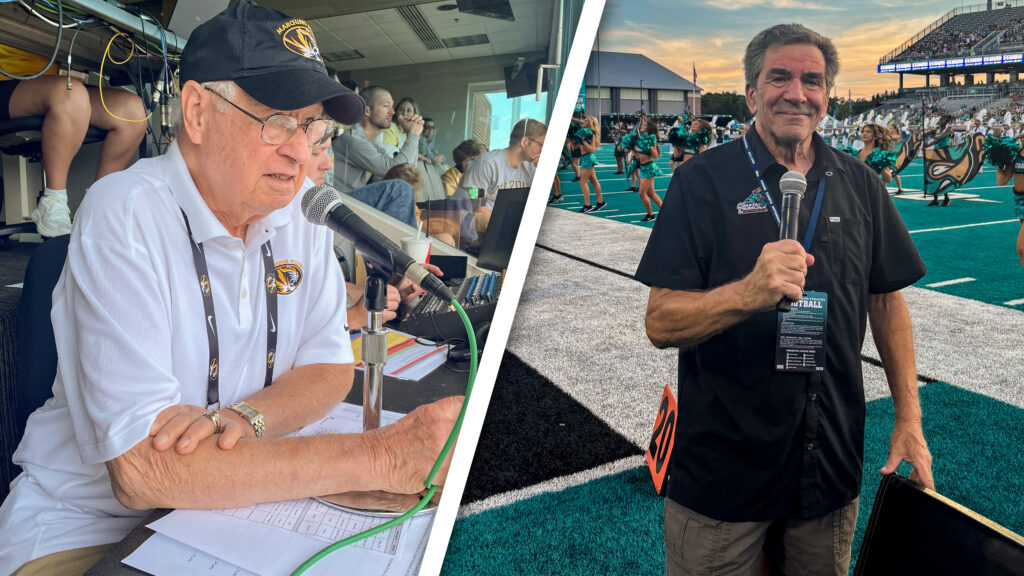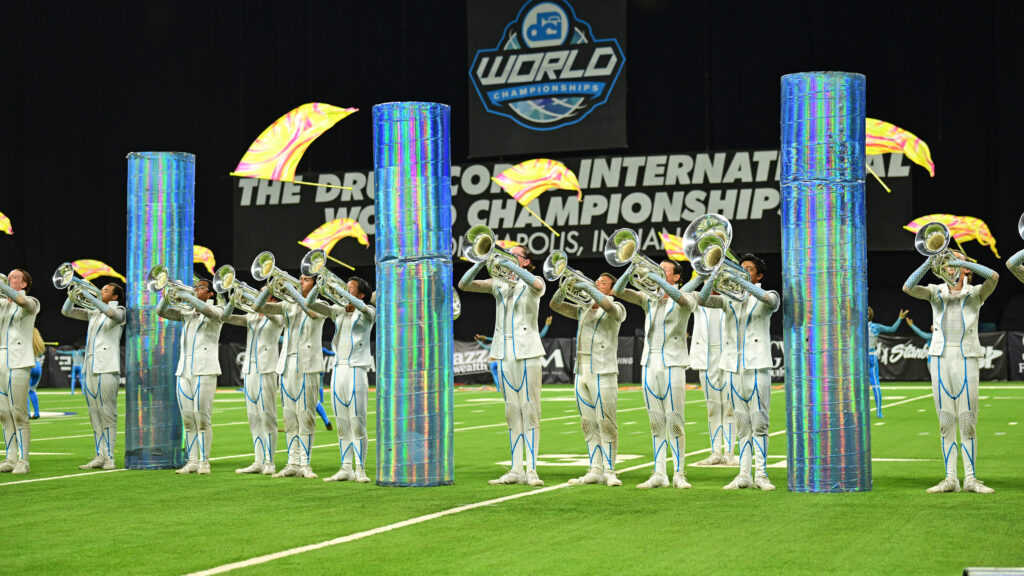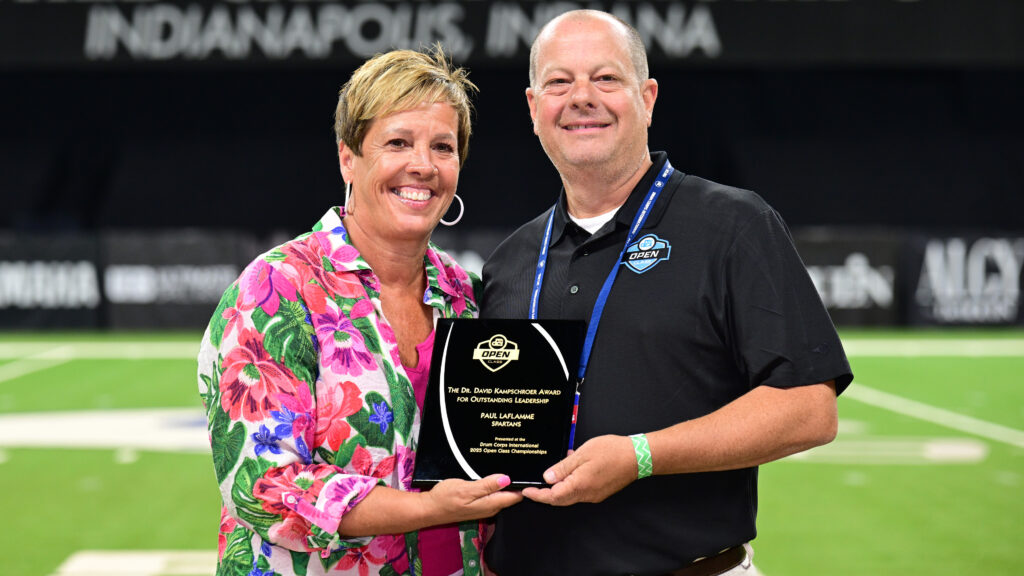A while back, a corps fan now in the military overseas sent in an emotional e-mail about what drum corps means to him. (“Beating a Cadence of Strength,” Fanfare, Nov. 15, 2002.) Fanfare, Nov. 15, 2002.) At the end of the column, I asked for other military members and veterans to respond, and to share stories of how drum corps has helped them cope in the service.Raymond Fudge marched with the Springfield, Mass., Targets from 1963 to 1967. He was drafted into the Army in 1972 and did a tour in Germany with the 3rd Infantry Division. He recalls, “After spending several years in drum corps, I found Army drill and ceremony to be a piece of cake. I could do that stuff blindfolded. I felt that the average drum corps could mark rings around the best military ceremonial units. It was mainly the marching. “One of my fellow trainees was George Peasley, who had marched with the Pittsfield, Mass., Cavaliers. Both of us were far ahead of the curve when it came to d and c (drills and ceremonies), and we could execute every movement in FM 22-5, the Army field manual (instruction book) on all aspects of marching and manual of arms.
“We [1960s] drum corps folks spent a lot of time standing in the sun. Afternoon shows were always ‘fun.’ Between the ready line, the inspection line, and the starting line, you could count on a good 30 to 45 minutes of standing time before you went on. I do not miss that aspect of the activity one bit. However, the discipline and endurance that we picked up in drum corps served us well [in the military]. Standing at attention in the hot sun didn’t bother us a bit.” Randall Musgrave marched Florida Wave in 1983, in what he says was the single most influential summer of his life, teaching him many things he has since used every day.Randall recalls, “I joined the Navy right out of high school, as my grades weren’t that good, and my parents couldn’t afford to pay for college. Fortunately for me, I chose to go to Boot Camp in San Diego, Calif. After a full day of in-processing in Ohio, and a cross-country flight to California, I was exhausted when I arrived at the Recruit Training Center. “We got off the bus (accompanied with a lot of shouting, not unlike the [corps] drum major unloading the buses at the schools), and went into the receiving room. Inside, there was an imposing figure with a clipboard shouting orders to ‘stand on the white footprints!’ We did as told, and then he said ‘anyone with marching, band, ROTC experience, move to the yellow footprints.’ We moved, and the group was smaller.
“After we were sorted out, he told us we were selected for an elite company that would be responsible for the successful execution of our division’s graduation 10 weeks hence. I thought, ‘OK, now what?’ Some of us would be part of the 50-state flag team, the ‘crack rifle’ drill team, and the drum and bugle corps. I thought, ‘Now, I’m in my element!’After four weeks of ‘normal’ boot camp, we moved to the ‘Drill Division’ to get our assignments. I was sent to the brass section, and the first thing out of the instructor’s mouth was, ‘Have any of you ever played a bugle?’ I looked around to see no one had, and raised my hand. He asked where, and I told him. He said, ‘Go show these guys what the fingerings are, and then we’ll start auditions.’
“I auditioned, and was assigned first soprano, along with the four other guys who had been there before me. Drill was never a problem and facing movements were a breeze. All the yelling never even fazed me, unlike some of my peers. Boot Camp was easy! I learned the 18 songs we had to memorize within 48 hours, and was soon signing off on my friends’ memorization. I was chosen as the soloist for our pre-graduation drill show, and the division bugler for the graduation ceremony. Being the division bugler required me to memorize over 40 different bugle calls on top of my music.
“One guy I played with in Boot Camp was a week ahead of me, and had joined the Navy to be a musician. He asked me how I picked up the differences between a trumpet and a soprano bugle so easily. I told him I played with the Wave. He asked when, and I told him 1983, he said, ‘I saw you guys in West Virginia! You were incredible!’ That made my day, being remembered two years after the fact.
“After Boot Camp, I played for the Service School Command Band at Great Lakes Naval Training Center in Illinois, performing at different ceremonies and parades in the Chicago area. I moved up to assistant director, instructing the brass section before going to sea five months later. I’ve served as the ship’s bugler on three different ships over the past 15 years, rendering military honors for our departed veterans.
“The whole drum corps mindset taught me that although things might be hard, they are worth the effort in the long run. Overcoming adversity is sometimes a daily occurrence in drum corps and the military alike. These lessons have served me well for all of my 17 years in the Navy.”
Derek Sangster is a Marine who marched both junior and senior corps; including the Saginaires (later known as Northern Aurora) from 1979 to 1991, and the Hawthorne Caballeros from 1993 to 1995. He will be retiring from the Marine Corps in 2004.
Derek remembers himself as being a problem teenager when it came to discipline. “I found out very quick that drum corps discipline was almost like military discipline. Drum corps taught me how to march and take pride in myself, my uniform, and taught me about being part of one big family. When I went to boot camp, I was selected as a squad leader because I could march from day one and I knew how to stand still without moving around. I thought that once I finished junior corps, I was done marching.
“I got orders to Garden City, N.Y. in 1992, and I read an issue of Drum Corps World that included a story about Dennis DeLucia, [who lived nearby]. I called him and asked him about finding a good senior corps to march in, and he happened to write and teach the Caballeros that year. Guess what corps I went to? I was still on active duty and I marched three years with them. We won the DCA World Championship in 1995.
“I never had any problems from my command and they were very supportive of the corps. Drum corps has been very helpful for me through life as well. I worked as the Quality Assurance Chief for the 1st Marine Corps District, which is located throughout the Northeast. My working hours were from 8 a.m. to 4 p.m., Monday through Friday, with no weekends. I had plenty of support from my command and I would give out water bottles and T-shirts with ‘US Marine Corps’ written all over them to promote the Corps.”Sam Signorelli marched soprano in the 1984 Blue Devils, and went on to march in the Keesler Air Force Base Blue Knights, the Dagenham Crusaders, Empire Statesmen, and is currently in the SoCal Dream Sr. Corps.
He went straight into the military upon aging out of Blue Devils, and in fact was on delayed entry into the U.S. Air Force so he could finish up the season. As he remembers, “The fact that I had just finished the season when I went to San Antonio definitely got me through Basic Training, even though it was six weeks of summer camp by comparison to touring for a season.
“I remember one incident in particular that proved how much I had learned. We were being taught basic facing and marching movements, and, of course, I was zoning out because I already knew this. The squadron 1st Sergeant was walking by and noticed. He called me on the carpet in front of the entire squadron. I reported, ‘Sir, Airman Signorelli reports. (All you AF guys will remember THAT little phrase). I’ve been marching in competition for eight years, and just came off a season with a five-time world champion drum and bugle corps. This is second nature to me.’ ‘Really?’ replied the Sergeant. ‘Let’s have a drill down, Airman.’
“I proceeded to nail every move the man gave me. He stood for a moment, considering what just happened, then addressed the rest of the squadron. ‘If anyone needs help marching, see this man.’ Then he walked away! After doing a season with the Blue Devils, nothing seemed difficult!
“And this from a guy who’s always considered himself one of the top-ten worst marchers in Blue Devils’ history! There’s an interval error in the closer that haunts me to this day! [DVD alert!] It’s around the 11:20 mark, in the soft passage ‘Like a Lover’ High camera shot. Look for a line of sopranos sliding with tiny steps to the viewer’s left, heading toward the guard. Find the soprano fifth from the right end, then watch as we turn backfield and right slide at the same time. I opened up a hole you could drive a truck through! I closed it before we turned around again, but it was one of those moves I never DID nail down. I don’t think it cost us the show, but it’s always bothered me that I couldn’t get it.”
[Now you have one more reason to buy the Legacy Series of DVDs, at least the one from 1984.]
Calling all readers — Did drum corps save your life, either literally or figuratively? Please share your story with us for consideration in a future “Fanfare” column. Send your contribution to Michael Boo at [email protected]. Please put “Drum Corps Saved My Life” in the Subject heading at the top of your e-mail.Please include your name, hometown, corps affiliation (if applicable) and years marching with or working with the corps (if applicable). No anonymous comments, please. We will credit you for your contribution. Michael Boo has been involved with drum and bugle corps since 1975, when he marched his first of three seasons with the Cavaliers. He has a bachelor’s degree in music education and a masters degree in music theory and composition. He has written about the drum corps activity for over a quarter century for publications such as Drum Corps World, and presently is involved in a variety of projects for Drum Corps International, including souvenir program books, CD liner notes, DCI Update and Web articles, and other endeavors.Michael currently writes music for a variety of idioms, is a church handbell and vocal choir director, an assistant director of a community band, and a licensed Realtor in the state of Indiana. His other writing projects are for numerous publications, and he has published an honors-winning book on the history of figure skating.His hobbies include TaeKwonDo and hiking the Indiana Dunes.But more than anything, Michael is proud to love drum corps and to be a part of the activity in some small way, chronicling various facets of each season for the enjoyment of others.





